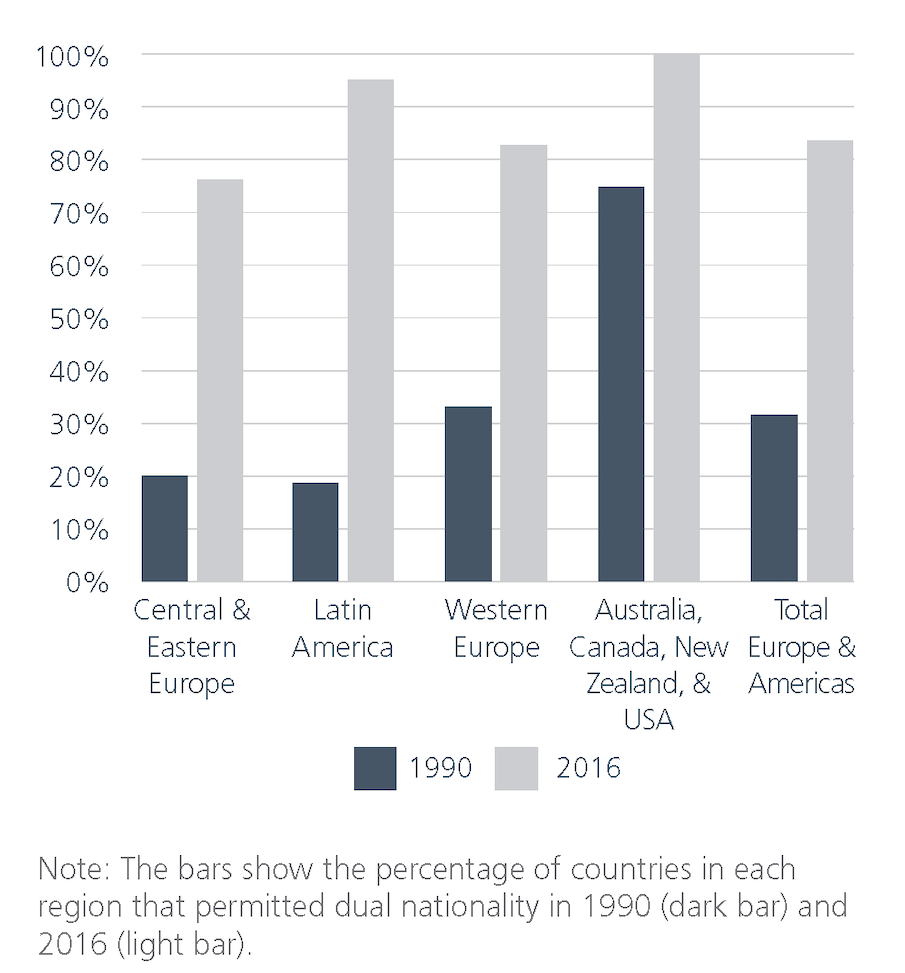Prof. Dr. Yossi Harpaz is Associate Professor of Sociology at Tel Aviv University in Tel Aviv, Israel.
Citizenship is the key status that determines a person’s position in a hierarchical global system. Those who are born with the ‘right’ citizenship — say, Swedish or Canadian — gain access to a formidable package of opportunities, rights, and security that is nearly unimaginable to persons born with, say, Somali or Syrian citizenship. Only about 15% of the world’s population holds citizenship from the EU or other highly developed countries: Australia, Canada, Japan, South Korea, or the USA. Relative to the remaining 85% of humanity, they are a global elite in terms of citizenship rights. The gaps between the highly developed, mostly Western countries and (almost all) of ‘the Rest’ are vast: the economist Branko Milanovic´ has calculated that the 5% of Americans with the lowest incomes still have an average income that is higher than 60% of the world’s population (they are in the 60th percentile of the global income distribution). Meanwhile, the earnings of the lowest income Danes place them in the 90th percentile of the global distribution of incomes.
The elite status of Western and EU citizenship becomes even more striking when we take into consideration its extraterritorial value — that is, the recognition that these passports receive in countries other than the countries that issued them. This perspective reveals a vast disparity in global travel freedom. For example, Spanish citizenship offers a package that (through EU citizenship) also includes the unrestricted right to reside and work in Germany or Sweden, and visa-free or visa-on-arrival access to the USA and Canada. Travel freedom has become particularly valuable in today’s globalized world, where the ability to cross international borders plays a key role in determining individuals’ economic opportunities, consumption habits, and social status — sometimes even their personal safety.

We can view citizenship, then, as a sorting system that allocates individuals into different — and starkly unequal — slots within a global matrix of states and citizens. For most of the 20th century, this sorting system did not tolerate overlaps: countries demanded exclusive allegiance from their citizens and typically did not permit multiple citizenship. In 1990, only about a quarter of the countries in Europe and the Americas permitted dual nationality. Soon thereafter, legal norms rapidly began to change. Numerous factors, including a boost in international migration and the end of the Cold War, have combined to make dual citizenship legally and normatively acceptable. By 2016, more than 80% of countries in Europe and the Americas permitted dual citizenship. Today, the acceptance of multiple citizenship has become the norm among developed countries. The few countries that resist this trend — for example, Austria and Japan — are now the exception.
Figure 1. Percentage of countries per region that permitted dual citizenship (1990, 2016)
Source: Reproduced from Y. Harpaz, Citizenship 2.0: Dual Nationality as a Global Asset (Princeton University Press 2019)
The acceptance of dual citizenship might appear at first to be a minor, technical change, one that would have consequences only for specific categories of individuals (such as immigrants and the children of parents of different nationalities). In fact, however, waiving the traditional requirement for exclusivity has the potential to change the basic ways that states and individuals approach national membership. As citizenship becomes more flexible, many states now extend citizenship to populations that live outside their territories but are nonetheless desirable for other reasons — because of their ancestry or ethnicity, or even because of their value as potential entrepreneurs and investors.
From the point of view of individuals, the change is even more dramatic. In the ‘traditional’ system of exclusive national membership, citizenship operated as a strict, rigid status: once assigned (usually at birth), it could be changed only with great difficulty. Acquiring a second citizenship typically entailed giving up the original one. Once it is possible to hold more than one citizenship, all this changes. Citizenship is now flexible and fungible. In sociological terms, citizenship is changing from being an ‘ascribed status’ — meaning a characteristic that is fixed and imposed from the outside — to an ‘achieved status’, meaning that it can be changed through individual striving. Persons around the world can strategically plan their citizenship status and seek the national affiliation that they think will provide them with the greatest benefits for the smallest investment. Although only a very small percentage of humanity has done this, the fact that such strategies are now possible leads to changes in the value and meaning of citizenship. Citizenship is being drawn into the capitalist market and is coming to be perceived as a piece of private property — even a commodity.
The new principle of dual citizenship toleration — and the concomitant commodification of citizenship — adds dynamism to the rigid system of citizenship‑based global inequality, providing new ways for people to improve their position in the global hierarchy. The clearest expression of this is a phenomenon that I call compensatory citizenship: individuals from outside the West who obtain a second citizenship from a Western or EU country. The second, premium citizenship is ‘compensatory’ because it is typically used to complement the primary, resident citizenship rather than replace it. Most individuals who obtain this kind of citizenship do not emigrate; instead, they are interested in securing an ‘insurance policy’, a premium passport and improved opportunities that their primary, resident citizenship cannot offer them.
Compensatory citizenship is found in countries that are in the middle of the global distribution of citizenship value and that host populations with a history of ancestral, ethnic, or migration ties with European and North American countries. This applies first and foremost to two regions: Latin America and Eastern Europe. When Italy and Spain offered dual citizenship to the descendants of emigrants, almost 1 million Argentinians and Brazilians applied for a second passport. In Eastern Europe, citizens of non‑EU countries rush to secure co‑ethnic citizenship from the countries that have joined the Union. Thus, hundreds of thousands of Moldovans, Serbians, and Ukrainians have secured citizenship from countries such as Hungary and Romania. In contrast, eligible individuals in Western Europe and the USA showed relatively little interest in converting their roots into a second citizenship. This demonstrates that the main force driving the demand for ancestry‑based European citizenship is global inequality: more specifically, the wish to secure compensatory citizenship and the practical advantages that come with it.
As millions of European descendants convert their ancestry into privileged access to the EU, individuals who do not have such ancestry are coming up with other methods to secure compensatory dual citizenship. One strategy is ‘birth tourism’: traveling to the USA and giving birth there with the aim of providing the newborn with automatic birthright citizenship. Given the expenditure involved in birth tourism — starting from USD 7,000 and ranging up to USD 25,000 or more — it is mostly practiced by wealthy families coming from a range of origin countries, including China, Mexico, Nigeria, and Türkiye. Another pathway to compensatory citizenship is strategic naturalization: naturalizing in a country with a liberal citizenship regime (for example, Spain, which allows Latin American immigrants to naturalize after a relatively short period) and then — once citizenship is secured — returning to one’s country of origin.
These developments lead to changes in the way people around the world understand and experience citizenship. I have conducted research on three study cases of compensatory citizenship: in Israel, Mexico, and Serbia. I will briefly present the Israeli and Mexican cases. The Israelis I studied were second- or third‑generation immigrants who drew on their ancestry to obtain EU citizenship (most commonly, citizenship of Germany, Poland, and Romania); the Mexicans belonged to middle- and upper‑class families that practiced birth tourism in the USA. Despite the geographical, cultural, and historical differences between the two settings, I found striking commonalities in the ways in which people related to citizenship.
Until quite recently, these combinations of dual citizenship would be highly provocative and controversial. First, Mexico did not permit dual citizenship until 1998. Second, Mexicans traditionally condemned emigrants to the USA — especially those who took up American citizenship — as traitors or rotten persons (pochos). In Israel, dual citizenship was always permitted by law but there was a strong social stigma against seeking German citizenship. In the eyes of many Israelis, taking German citizenship was an abomination — a blasphemous act tantamount to ‘forgetting the Holocaust’ and repudiating Zionism. Today, such discourses still exist in both countries, but only at the margins. Even if the partner nation is historically a rival or victimizer, dual citizenship is seen as widely legitimate, and dual citizens generally face little everyday censure.
As for citizenship applicants themselves, in Mexico and Israel they typically employed terms associated with property and economic interests when discussing citizenship. Mexican parents spoke of strategic birth as a long‑term investment in their children’s future. They calculated its costs against the expected benefits — above all, in terms of security, opportunities, and global mobility — while also considering associated additional costs (such as taxation). In Israel, the decision to apply for dual citizenship was often explained as a quest for restitution. Applicants commonly described German or Polish citizenship as an asset that was stripped away unlawfully from their immigrant parents or grandparents. Acquiring EU citizenship through these countries offered a degree of restitution for the lives and property that their families lost in the Holocaust. As in Mexico, the second citizenship was envisioned as useful only for the younger generation — for whom it would supposedly provide ‘opportunities in Europe’ (not in the specific origin country) and even make them ‘citizens of the world’.
This final point helps explain the lowered public resistance to dual citizenship in Israel, Mexico, and elsewhere. Along with its ‘marketization’ and commodification, citizenship is also becoming denationalized, meaning that it is coming to be associated less with a specific nation and more with economic benefits and standing within a global society.
Prof. Dr. Yossi Harpaz is an Assistant Professor in Sociology at Tel Aviv University, Israel. He has received his PhD in sociology from Princeton University. Prof. Harpaz’s research deals with contemporary changes in the institution of citizenship and their impact on global inequality and national identity.
His work has been published in the British Journal of Sociology, International Migration Review, the Journal of Ethnic and Migration Studies, and other journals. Prof. Harpaz’s first book, Citizenship 2.0: Dual Nationality as a Global Asset was published in 2019 by Princeton University Press. This essay is based on the book's main findings.